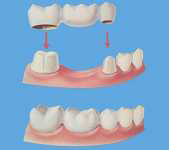Dental Implant in Pattaya
Dental implant is the replacement for the root portion of natural tooth and is anchored into a pre-drilled socket in your jaw-bone to support crown, bridge or secure a denture firmly in place. Implants are made from titanium, a material that is well tolerated by bone and integrates easily with bone tissue. During the placement of a dental implant the goal is to achieve a close contact between the outer surface of the implant and the surrounding bone tissue so they can fuse together (osseointegration) creating a stable support for the new teeth. In general, dental implant works are required two trips to Pattaya and Thailand. Your first trip is for implant body placement and takes around seven days in Pattaya. You will get temporary crowns back to your home. That means there is no missing teeth while you smile and our dentist will provide temporary crown that good enough for not be noticed by your friends and families. Then, you come back Pattaya again 2nd trip another week for permanent crowns when implant body properly fuse to your bone after 10-12 weeks. There is also immediate implant option but can be applied with some patients only. It takes 7-10 days for all processes.
Tooth Loss Causes:-
People who have lost teeth might feel too self-conscious to smile or talk. Additionally, biting irregularities caused by tooth loss can have a negative effect on eating habits and this can lead to secondary health problems like malnutrition. Regardless of the nature of problems related to tooth loss, dental implants may provide a simple remedy with proven results.
- Gum disease
- Root canal failure
- Congenital
- Excessive wear
- Trauma
- Accident
- Periodontitis
- Tooth decay
People who have lost teeth might feel too self-conscious to smile or talk. Additionally, biting irregularities caused by tooth loss can have a negative effect on eating habits and this can lead to secondary health problems like malnutrition. Regardless of the nature of problems related to tooth loss, dental implants may provide a simple remedy with proven results.
Dental Restoration Comparison
- Dental Implant

- Dental Bridge

- Partial Denture

Esthetics
Dental implant should be indistinguishable from your surrounding natural teeth. Dentures can come loose and look un-natural if they do not blend with your gums and some bridges and dentures have unsightly metal clasps to hold them in place. Dental implants provide a much better cosmetic and functional end result.
Mastication function
Once dental implants are fully integrated into you jaw they function just as well as your own natural teeth and you can eat the foods you want and speak with complete confidence. With dentures, eating hard foods such as an apple can be a problem, either the dentures come loose or patients cannot withstand the hard biting forces as they cause pain in the gums. Irritation and inflammation of the gums is a common problem amongst denture patients. Dentures can be supported by implants or mini-implants which will improve function greatly enabling patients to eat the foods they want with complete confidence and not having to worry about bone loss and loose dentures falling out.
Avoid Removing Healthy Teeth Structure
Unlike dental bridge, the teeth adjacent to the gap need to be prepared and healthy tooth structure is removed to accommodate a crown or bridge abutment to fit over the top of the tooth. In the future if one of the supporting teeth is damaged the entire bridge restoration will also be compromised whereas with an implant the restoration is independent of any of your other teeth. By replacing lost teeth with an implant, no support is required of the adjacent teeth, and hence your natural teeth do not need to be prepared or altered in any way
Reduced bone loss
Normally, the bone tissue surrounding the root of your tooth is maintained by your bodys natural renewal process. However, if you loose a tooth, you will be left with a hole where your tooth root used to be and the bone around this area will slowly begin to disappear (atrophy) and may change the shape of your jaw. A dental implant placed in that area can actually stimulate bone growth and production, preventing loss of valuable bone structure. In some patients where bone loss is substantial a bone graft may be required before placing a dental implant. Bone loss is a problem for people who have dentures and as the shape of the jaw slowly changes the dentures need to be adjusted or re-made to fit the new shape of the jaw. Bone loss can also make a person look older since the area around the mouth can sag as bone is lost
Number of Implant Indication for Full mouth case
Traditionally, implant will be placed into your bone to support a single crown known as Single Tooth Implant. However if you have several missing teeth you do not necessarily need an implant for every missing tooth, one implant can support several teeth via a bridge or a denture. The number of implants required depends on the volume and density of bone tissue available at each implant site. Often smaller sized mini implants are used to secure dentures in place. In the case of full mouth reconstructions where an arch of several teeth (10+) need to be supported in either the upper or lower jaw a minimum of 5-6 implants in each jaw would be required. The exact number of implants needed would depend on the individual case and Dentist @ Beach would be able to advise you on the best solution after a through examination and assessment in Pattaya.











